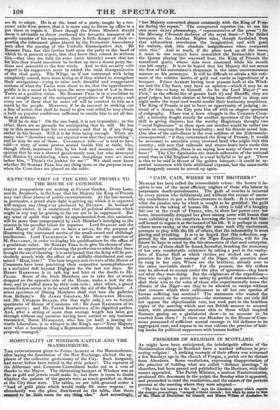HOSPITALITY OF WINDSOR CASTLE AND THE MANSIONHOUSE.
THE entertainment given to Prince ALBERT at the Mansionhouse, after laying the foundation of the New Exchange, elicited the ap- plause of the collective gastronomy of the City. Such burgundy had never before been tasted in the civic palace! The raptures of the Aldermen and Common-Councilmen broke out in a vote of thanks to the Mayor. The christening banquet at Windsor was as fine as gold and jewels could make it; but there is room to doubt whether the palates of the guests were as much gratified as those at the City feast were. The tables, we are told, groaned under a "load of gold plate which would really fill some wagons : so abundantly was the plate distributed on the table, that there seemed to be little room for any thing else." And accordingly, "her Majesty conversed almost constantly with the King of Pins.. sia during the repast." The enraptured reporter (or, to use his own more dainty phraseology, "representative of the press ") for the Morning Chronicle declares of the royal feast—" The fabled banquets in the Arabian Nights tales, though furnished from that exhaustless storehouse the imagination, and with genii for waiters, sink into absolute insignificance when compared with this." And in truth, if the plate took up all the room, it must in one respect have resembled the Barmecide's feast ; the Queen playing the wayward host, the King of Prussia the tantalized guest, whose ears were crammed while his mouth was left empty. It is to be hoped that his Majesty did not arrest the flow of his entertainer's eloquence in the same unceremonious manner as his prototype. It will be difficult to obtain a fair esti- mate of the relative merits of gold and turtle as ingredients of a banquet. Prince ALBERT having been present both at the Wind- sor and the City feast, may have an opinion—which it may be as well for him to keep to himself. As for the Lord Mayor (" see Pine," as the official list of guests hath it) and Sheriffs, they are good judges, but their elation at having been allowed to sleep one night under the royal roof would render their testimony suspicious. The King of Prussia is not to have an opportunity of judging : in- stead of a dinner, the City puts him off with an elegant specimen of caligraphy. There was a keen struggle in the Common Coun- cil: a minority fought stoutly for another specimen of the Mayor's skill in giving dinners; but the worthy Magistrate thought two "royal highnesses" so close upon one another would be rather too severe an exaction from his hospitality ; and his friends saved him. One idea of the anti-diners is the true sublime of the Aldermanic- consequential: "if they entertained the King of Prussia it would be necessary to entertain every crowned head who might visit this country ; and DOW that railroads and steam-boats have made this country so accessible, there is no saying how many of them we may have!' The City dignitaries are stanch adherents of the national creed that in Old England only is a real bellyful to be got. There is this to be said in favour of the golden banquet—it could be re- peated tomorrow with little additional expense, but the same turtle and burgundy cannot be served up again.


























 Previous page
Previous page